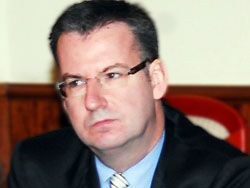
A qualitatively new period started in the EU-Moldova relations, said the Head of the European Union Delegation to Moldova Dirk Schuebel. “As I use to say, the honeymoon is over. We now became a real couple and time has come to work together, live together, have the same massages and do the same acts,” said the European official, appraising the Moldova Country Report on the 2010 accomplishments, Info-Prim Neo reports.
It is a more positive than negative report. Miracles didn’t happen, but nobody waited for miracles, said Dirk Schuebel. “You made considerable progress in fulfilling certain political commitments, but the political commitments and the domestic reforms are two different boots. That’s why we will continue to measure the success in these internal reforms. You must implement those political statements made by your authorities, while we will measure on the basis of these successes,” he stressed, adding that the EU’s assistance will depend in continuation exclusively on these results.
“But in general, Moldova cannot complain of deficit of support on the part of the EU. I said that the total support already amounts to €550 million and will be increased in 2010-2013. Besides, the President of the European Council will pay a visit to Moldova in the near future, which is also a good sign of the support provided,” said the diplomat.
Dirk Schuebel also spoke about the controversies over the rights of gender minorities. “We will attentively follow the observance of the rights of different minorities, including religious, sexual and any other minorities. As far as you know, the law on nondiscrimination is part of the plan of action on visas. If this law is not fully implemented, the plan of action for liberalizing the visa regime will not be fully implemented either,” said the European official.
According to the Country Report, last year Moldova faced long-term political instability and serious budgetary constraints. The political dialogue between Moldova and the EU was rather intense. An EU Group of Minister for Moldova’s European Action was set up in Brussels in 2010 as an informal ministerial forum for providing consultancy to Moldova in the process of preparing itself for integration into the EU. A new impetus was given to the public administration reform. The large international financial support contributed to Moldova’s efforts to maintain the living standards. Towards the end of the year, Moldova returned to the macroeconomic objectives laid down in the plan of action. This enabled the EU to offer Moldova significant macrofinancial support.
In 2011, additional progress is needed to implement the measures adopted in accordance with the EU-Moldova Plan of Action within the European Neighborhood Policy, namely to strengthen the mechanisms for preventing the violation of the human rights and fundamental freedoms, improve the functioning of the market economy and the business and investment climate, promote the reform of the legal system and ensure the rule of law, ensure the neutrality of the mass media and promote the combating of trafficking in human beings, says the Moldova Country Reports that was presented this week to the European Commission and the EU High Representative for the Common Foreign and Security Policy.

